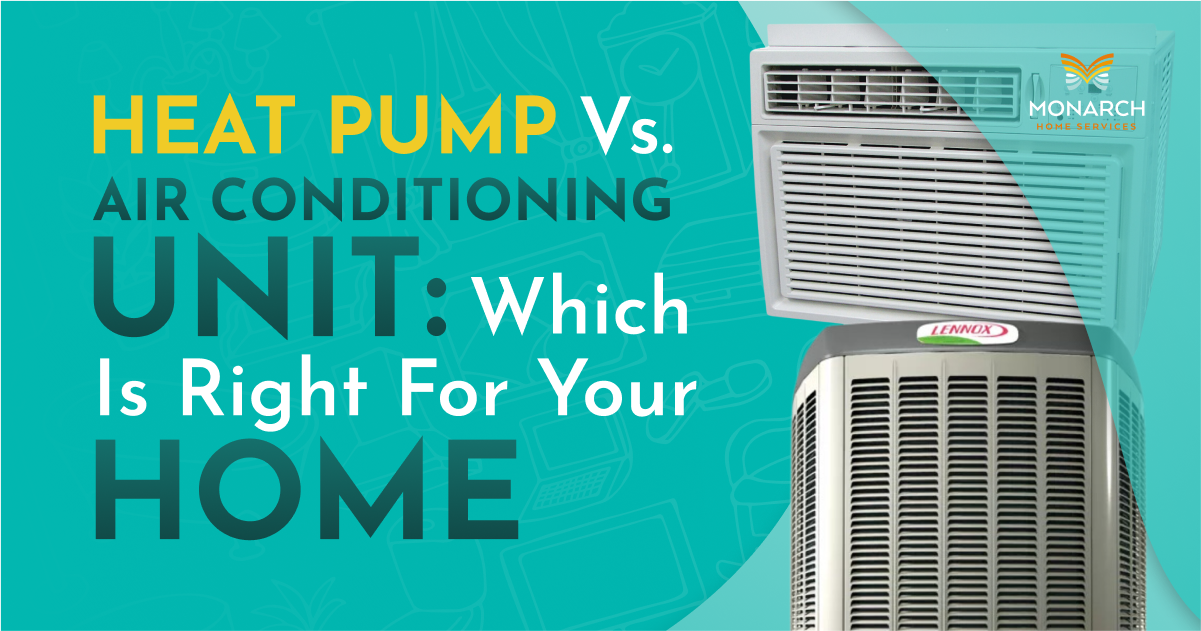Homeowners looking to replace their HVAC systems often consider a heat pump vs. an air conditioning unit. If you’re not sure about this AC unit alternative, a heat pump looks very much the same. It also serves the same purpose, although it differs in that it also provides heating. To help you decide which system to purchase, we’ll look at how each works and which might be right for your home.
How Does a Heat Pump Work?
A heat pump can either extract heat from your home to make it cooler or move ambient heat from relatively cool air outside to provide heating. In many homes, it can replace a heating and cooling system, especially if you live in a milder climate. Unlike a traditional air conditioner, a heat pump has a reversing valve that changes the direction of refrigerant flow. This allows you to switch between heating and cooling modes.
The Function of an Air Conditioner
When you look at a heat pump vs. an air conditioning unit, both have outdoor condensers and indoor evaporator coils/air handlers. The refrigerant in an AC system flows just one way. This chemical evaporates and absorbs heat, cooling the evaporator coil. A fan blows across the chilled coil to distribute cooled air. The heated refrigerant is returned to the outdoor unit where a separate fan releases excess heat into the air outside.
In cooling mode, heat pumps and air conditioners essentially work the same way.
Which Is Better?
When it comes down to a heat pump vs. an air conditioning unit, the better choice depends on your home, preferences, and budget. Here’s a breakdown of the main factors to consider:
- Efficiency: Heat pumps use electricity, instead of natural gas or propane, to provide heat. They also condition more air by volume compared to the energy used. Air conditioners can be expensive to run since they use more electricity (operating expenses can vary based on local utility rates).
- Comfort: Air conditioners cool the air quickly and effectively, especially in a large home. The effectiveness of a heat pump can vary if the outside temperature drops below freezing. Both use ductwork to distribute conditioned air.
- Durability: Air conditioners can last longer because, in most places, they’re used for only part of the year. Heat pumps often have a shorter lifespan since they are used all year long. However, the lifespan of each can vary based on climate, usage, and maintenance.
- Cost: According to Forbes, an AC system can cost $3,000 to $7,000 (not including a furnace), while a heat pump can range from $1,500 to $10,000. Equipment costs vary considerably by the size of your home, as larger spaces require more heating/cooling capacity.
How to Decide: Downsides of a Heat Pump vs. an Air Conditioning Unit
Looking at some of the downsides of each can further help you make an informed decision. The following considerations can help you understand potential disadvantages:
- Size of Your Home: Heat pumps are more expensive and become more costly the larger they are. Large homes may require multiple heat pumps to meet all their heating requirements. Meanwhile, a central AC system uses ductwork to distribute conditioned air to every room.
- Maintenance: A heat pump may need professional maintenance twice a year if you use it every season. Air conditioners should be inspected in the spring and fall but typically need a tune-up just once a year.
- Process of Switching from AC to a Heat Pump: Upgrading to a heat pump from an air conditioning unit has its benefits. However, the equipment and installation process is more complex. You need a pro to install an AC or heat pump. Also, the upgrade may require installing larger ductwork and updating your electrical system. Heat pumps also require a specific type of thermostat.
Call Monarch Home Services to Help You Choose
Are you thinking about replacing your AC or furnace with a heat pump? Considering a heat pump vs. an air conditioning unit isn’t simple. The technicians at Monarch Home Services are trained to evaluate your home and determine factors such as the required heating/cooling capacity. Some homes require additional updates before a heat pump can be installed, such as Wi-Fi thermostat installation. We handle the entire planning and installation process so you have the ideal solution for your home. To learn about our financing options and schedule a free quote, call (661) 215-6428 today.


